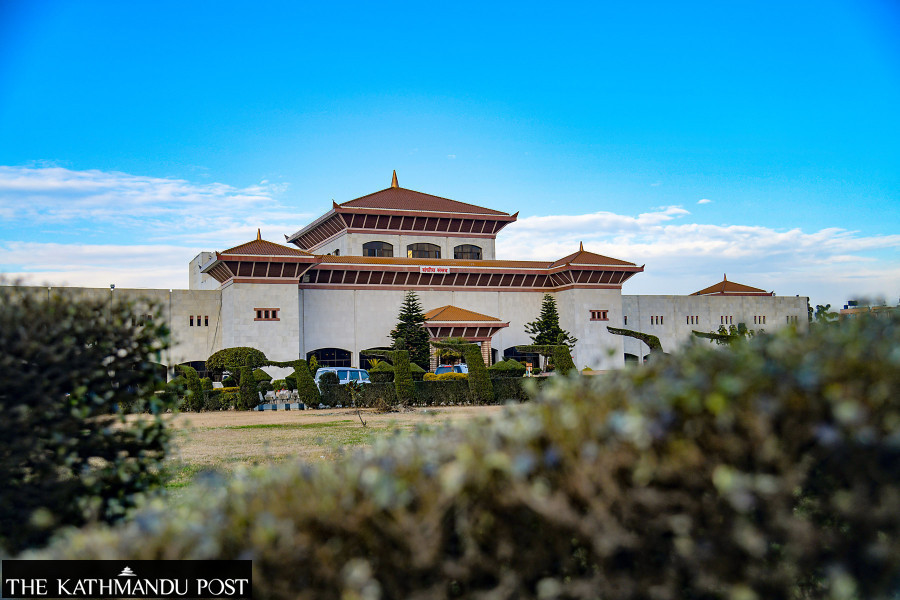Politics
Parliament session begins today amid obstruction threats by UML
There are 57 bills pending in the two Houses of the parliament. According to some lawmakers, Prime Minister Deuba is keen to table the MCC compact during this session.
Tika R Pradhan
The winter session of the federal parliament, which is also considered a bills session, is all set to start from Tuesday.
With the main opposition, CPN-UML, vowing to obstruct the proceedings, it is not certain whether the House of Representatives could function, as a host of bills are awaiting passage.
The UML has been obstructing parliament proceedings since the ninth session that convened on September 8. The last session ended without endorsing a single bill, except those related to the budget.
There are 57 bills pending in the two Houses of the parliament—42 in the Lower House and 15 in the National Assembly.
Many of them are crucial including the Citizenship Bill which could not move ahead for the last two years. They are expected to move ahead during this bills session but leaders, lawmakers and observers wonder how.
On December 3, while assuming office after being re-elected as party chair, KP Sharma Oli had told reporters that his party would continue obstructing the House proceedings until the lawmakers expelled by his party join parliament meetings.
On August 17, the CPN-UML had recommended that Speaker Agni Sapkota strip 14 lawmakers including Madhav Kumar Nepal. But 13 days later on August 29, Sapkota said action against them was not needed, as they had already formed a new party, CPN (Unified Socialist).
Nepal formed the new party on August 18 which was duly registered by the Election Commission on August 25.
Irked by the Speaker’s decision, the main opposition has been disrupting all the House meetings.
“Our stance has not changed. We have called the meeting of our parliamentary party prior to the House meeting on Tuesday to discuss on how to move ahead,” said Subas Nembang, deputy parliamentary party leader of the UML. “Let’s see how things will unfold.”
He said it was the government's duty to resolve the issue but those in the authority are least bothered.
After inspecting the preparations at the parliament building at New Baneshwar, Speaker Agni Sapkota told reporters on Monday that he would try to end the obstruction by holding dialogues with the leaders of different parties in Parliament besides holding all-party meetings.
But the agitating party leaders had boycotted Sapkota’s all-party meeting called on September 13 to discuss ways to resolve the deadlock caused due to the obstruction of the UML.
One of the most crucial bills related to federal civil servants was withdrawn by the government along with the Railway Bill before the Dashain holidays.
“Both the bills related to civil servants and railways were withdrawn before Dashain but the government has not come up with their replacements yet,” said Gopalnath Yogi, secretary of the House of Representatives.
However, the government is yet to come up with another bill to cater to the problems faced by provincial governments in managing the civil servants.
As per the preliminary schedule of Tuesday’s first meeting issued by the Parliament Secretariat, ministers are scheduled to present six ordinances related to some crucial bills pending in Parliament.
The bills, presented a day before the government recommended the President to call the new session of the federal parliament, include first amendment to Nepal Police and Provincial Police (work execution, supervision and coordination) Ordinance 2078 BS; one related to acid attack; first amendment to Social Security Ordinance; Railway Ordinance 2078 BS; amendment to the Act against Sexual Violence and amendment to some acts related to criminal offense and criminal procedures.
According to some lawmakers of the ruling Nepali Congress, Prime Minister Sher Bahadur Deuba is keen to table the Millennium Challenge Corporation (MCC) compact during this session of Parliament.
The House session has been called about two weeks earlier than the usual schedule, which has left many wondering if it has to do with the Millennium MCC compact, a $500 million American grant, which is awaiting parliamentary ratification.
The MCC headquarters in Washington is also holding a board meeting to discuss the Nepal Compact on December 14.
Radheshyam Adhikari, a member of the National Assembly, said there is a high chance that the MCC could be tabled at the House of Representatives this time and could also be endorsed through voice vote of simple majority if the parties like the UML and the Communist Party of Nepal (Maoist Centre) allowed conscience voting without imposing party’s whip.
“When the MCC will be tabled will depend on the Nepali Congress presidential election results,” said Adhikari. “It may be delayed if no candidate secures 51 percent votes and they go for a run-off.”




 8.54°C Kathmandu
8.54°C Kathmandu














